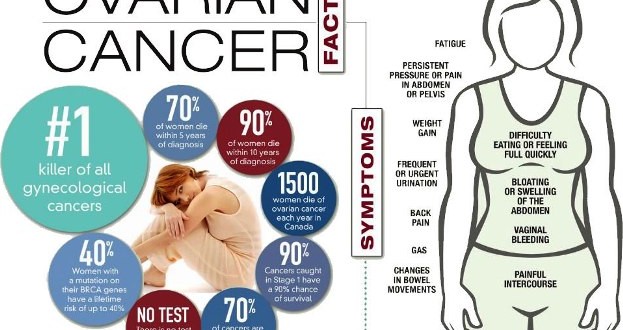The problems started when I was only in my teens. I began having excessively painful and abnormally long menstrual cycles. My mother soon took me to be examined by a gynecologist, where we found out that my uterus and ovaries were filled with cysts. Years of treatment, biopsies and minor surgery resulted in terrible news: My organs were so overrun that I would most likely never be able to have children.
Time passed. I continued taking the recommended drugs. I got married and, against all odds, became the mother of three daughters. I experienced no complications during the pregnancies, and for several years the cysts seemed to be shrinking. Then I hit my 40s. The cysts grew bigger and got stronger, provoking serious bleeding. I was diagnosed with ovarian cancer.
After my experience, I feel like I must spread awareness of this disease to as many women as I can. Hopefully, someone out there will be able to benefit from my knowledge.
Things to know about ovarian cancer
- There is no exact or proven cause for ovarian cancer. All women are at risk.
- Cysts may develop cancer, mainly in ovaries.
- Pap tests do notdetect ovarian cancer.
- Ovarian cancer is one of the most aggressive cancers, with a high death rate.
- Over 140,000 women die from ovarian cancer each year.
- Women often ignore symptoms, and thus do not get diagnosed until they are already at an advanced stage of the cancer.
-
Risk factors
-
Childbearing status
The less children you have, the greater your chance of getting ovarian cancer. Having multiple children and breastfeeding has been found to decrease your risk.
-
Family history
If someone in your family has ever contracted cancer of any kind, your risk may be higher.
-
Age
Women diagnosed with ovarian cancer are most often between 55 and 60 years of age.
-
Weight
Women who are obese have an increased risk of getting ovarian cancer and a higher risk of dying from it.
-
Symptoms
- Very heavy bleeding
- Increase in abdominal size or persistent bloating
- A loss of appetite or feeling full quickly
- Very often menstrual cycles will be irregular and appear or disappear suddenly
- Feeling tired and having very little energy
- Digestive problems (which is why there is so much confusion and difficulty making a diagnosis in many cases)
- Feelings of pressure or pain in lower back and belly
If you are experiencing two or more of these symptoms or have any of the risk factors mentioned above, it is imperative that you visit your doctor.
-
How can you prevent ovarian cancer?
The answer is simple: Live a healthy lifestyle. Observe and know your body, and pay close attention to any changes it goes through. Cut out canned foods, preservatives and anything containing high amounts of fat from your diet. Take up a sport or create an exercise routine. Try to keep your weight at a healthy level. And if possible, have children and breastfeed.
-
How can you detect it?
There are currently several tests such as MRI, ultrasound, blood tests, laparoscopy and even a particular type of pregnancy test that can aid in early recognition and intervention of this cancer. With any of these tests, ovarian cancer can be diagnosed in the early stages of development (Remember, as mentioned above, Pap tests do notdetect ovarian cancer).
-
What if you get diagnosed with ovarian cancer?
First, take a deep breath and feel grateful — grateful because having a diagnosis means you have options. It is much better than catching it too late or not catching it at all. Also, remember that cancer is not a death sentence. And an early diagnosis is a blessing.
Most importantly, do not give up. Get rid of any negative feelings or an attitude of defeat. Believe me, that will not help anything. Instead, battle your cancer with a determination to win. Fight it with chemotherapy or surgery coupled with a good attitude, faith and much hope.
Since my diagnosis, I’ve been busy improving my life: I eat healthier, run regularly, have fun as much as I can and spread awareness of this disease that so many women have to battle against, as I have done for you today. And let me tell you — I am winning.



